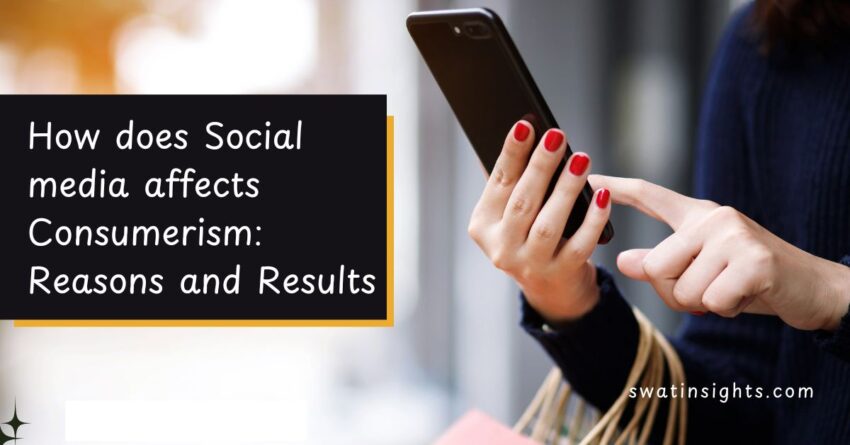Social media affects consumerism by shaping buying habits, fueling trends, and encouraging impulse purchases.
Earlier, social media was a place to connect with our family, friends, and community.
Over time, the place offers much more than just connection, which is appreciable.
The problem arises when it turns from a connection into consumerism.
Social Media and Consumerism
Every scroll brings new trends and new things to buy.
We constantly see ads and products that we buy not because we need them, but because everyone else seems to have them.
It blurs the line between what we want and what we need.
Here comes the concept of consumerism, which is wanting more and buying in bulk.
Consumers believed that these possessions would bring them happiness.
The growth of consumerism affects us in many ways.
But how does social media affect consumerism?
Today, we will try to understand the reasons behind it and the results we often overlook.
The Reasons:
Social media did not create consumerism, but it has amplified it, emotionally, visually, and psychologically.
How?
1. Lifestyle Selling
Social media often blur the line between personal and promotional content.
Paid promotions and recommendations often feel personal and organic.
The mindset drives impulse buying: If it worked for others, it will work for me too.
2. FOMO (Fear of Missing Out)
FOMO stands for Fear of Missing out.
Nothing spreads faster on social media than a trend.
Limited-time offers, flash sales, and chance stories all create urgency.
You see your friend using the latest gadget or skincare, and you want it too.
Fear of being left out fuels mindless shopping.
In a world of choices and confusion, minimalism brings simplicity and clarity.
Minimalism vs. Consumerism – Which leads to a better life?
3. Comparison Culture
Social media did not showcase the behind-the-scenes reality.
People showcase what they own, not what they need.
Seeing others’ luxury purchases, outfits, or travels can lead to self-doubt.
The result? Buying to fit in or feel better, not because you need it.
A global consumer culture also emerges, where people across different countries now have similar likes and buying habits.
Internet, social media, and advertising have shaped consumer habits, spreading trends quickly worldwide.
How does Globalization affect consumerism?
4. Targeted Advertising
Have you ever searched for a product and seen it everywhere afterward?
Businesses have taken a keen interest in social media because their customers are online.
Social media platforms track user behavior to serve targeted ads.
It becomes hard to distinguish between what you need and what marketers are selling to you.
5. User-Generated Content and Peer Pressure
You see friends unboxing products or posting online.
The trust factor is high: if they love it, I should try it too.
The result: normalizing excess purchases as casual habits.
10 Reasons that Cause Consumerism.
The Real Effects of Social Media-Driven Consumerism
It does not stop at just buying. Social media affects our mindset, money, and mental health.
1. Emotional Spending Becomes a Habit
Scrolling when you are bored, sad, or anxious often leads to unnecessary purchases.
Buying becomes a coping mechanism, but the relief is short-lived.
2. Debt and Financial Stress
The desire to match online lifestyles can push people to overspend or rely on credit.
The pressure to keep up can lead to feelings of guilt, stress, or even financial traps.
3. Shallow Satisfaction, Long-Term Emptiness
Constant buying creates a cycle of wanting more and never feeling enough.
The joy of new things fades quickly, leading to more purchases to fill that gap.
4. Environmental Consequences
Fast fashion, tech gadgets, and over consumption lead to more waste.
The more you buy, the more industries produce, harming natural resources.
5. Mental Health Takes a Hit
Social comparison increases anxiety, insecurity, and low self-worth.
The more you seek validation through things, the less fulfilled you feel.
Conscious Use of Social Media

You do not need to quit social media, but you can change how it influences you.
Conscious Use of Social Media:
- Limit daily screen time.
- Unfollow pages that trigger comparison.
- Pause before buying: do you need it?
- Turn off non-essential notifications.
- Follow uplifting or educational content.
- Avoid saving card details.
- Notice how scrolling makes you feel.
Try these simple shifts:
- Follow those who promote intentional living, not just consumerism.
- Unfollow or mute accounts that trigger comparison or FOMO.
- Use ad blockers or limit screen time to reduce exposure to shopping triggers.
Over time, these habits lead to stress and a constant feeling of not enough. But that feeling never lasts.
And slowly, you start measuring your worth by what you own, not how you live.
15 Real-Life Consumerism Examples and How to Escape From It?
Final Thoughts
Social media and consumerism are closely tied, and together, they shape what you want, how you spend, and even how you see yourself.
But awareness is the first step toward freedom.
Conscious consumerism is choosing what to buy based on your values and what you believe is right and fair

5 thoughts on “How does Social media affects Consumerism: Reasons and Results”